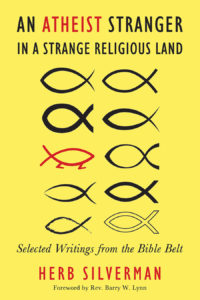An Atheist Stranger in a Strange Religious Land: Selected Writings from the Bible Belt

BOOK BY HERB SILVERMAN
PITCHSTONE PUBLISHING, 2017
264PP.; $15.95
Humanists know Herb Silverman well. He is a past board member of the American Humanist Association, founder of the Secular Coalition for America and the Secular Humanists of the Lowcountry in Charleston, South Carolina, a professor emeritus of mathematics, and the author of a previous book, Candidate Without a Prayer; An Autobiography of a Jewish Atheist in the Bible Belt. Readers of this magazine are likely also aware that Silverman was given the AHA’s Lifetime Achievement Award at the 2017 annual conference.
And yet, for those who know him even a little bit, it’s not his resume that comes to mind when you hear Silverman’s name, but his humor, his irrepressible cheerfulness and wit, and the pure fun of being around him. And that’s the person who shines through in his newest book, An Atheist Stranger in a Strange Religious Land: Selected Writings from the Bible Belt.
This book is not a sustained narrative. It’s a collection of Silverman’s writings from the last ten years, edited, refined, and categorized into thirty-one topical chapters. Among these are Atheism, Bible Talk, Islam, Marriage, Prayer, Sex, Science, and a chapter entitled “Sound Bites,” which could almost serve as the title of the book.
The chapter topics are arranged alphabet-ically, which suggests that these are writings that can be read in any order, at any time. And even within the chapters the writings are a bit random, freely going back and forth in time and subject matter. For instance, the chapter on presidential primaries has stories from the 2008, 2012, and 2016 elections, only somewhat in that order.
But while the arrangement and chronology of the writing may be a bit scattered, the actual writing is not. Silverman’s style is folksy and conversational, his thinking is clear and concise, and his gift for a punchline is unending. If there is a criticism, it’s that he often needs to set up the context of his wit, so some quips that are very funny in the moment suffer somewhat in the retelling of the story that led to it being uttered. Still, even the set-ups are quickly sketched, and I’m not sure a page goes by without several laughs or chuckles.
It would be a mistake to think that this is a book done purely, or even primarily, for the laughs. It’s not. Silverman uses humor to make and illustrate his greater points. Two points that consistently come through are, first and foremost, his commitment to pushing the secular humanist agenda, but also his strong commitment to finding areas of cooperation with others who share the same ethical values as humanists, including and especially with religious groups. This motivation to create good will is especially clear in his chapter on Islam, where he talks about how, after Donald Trump gave an inflammatory speech in Charleston, South Carolina, Silverman and his wife made a point of visiting a local mosque to say how pleased they were to live in the same community as Muslims. There they engaged in a brief but polite discussion with the Imam about their nonbelief in any God, but also discussed the importance of finding common ground and working together on areas of agreement. This communication and outreach with the local Imam is typical of the author’s approach.
Of course, Silverman gets his digs in at religion too. “Faith based knowledge is like regular knowledge, but without the knowledge,” he writes, elsewhere noting that “Unlike religion, glasses help you see the world more clearly” and that “God likes atheists better because we never bother him for anything.” Statements like these abound throughout the book. For all his emphasis on finding common ground and working together with those who share some common values, Silverman isn’t one to shy away from expressing his opinion when appropriate, and that leaves him a wide field. No one reading this book will have any doubts as to his beliefs and opinions.
In short, Herb Silverman has written a witty, provocative, wonderful book, touching on a wide range of topics and issues. It probably isn’t the first book you want to recommend to somebody looking to better understand atheism or humanism. But it might well be the second.
